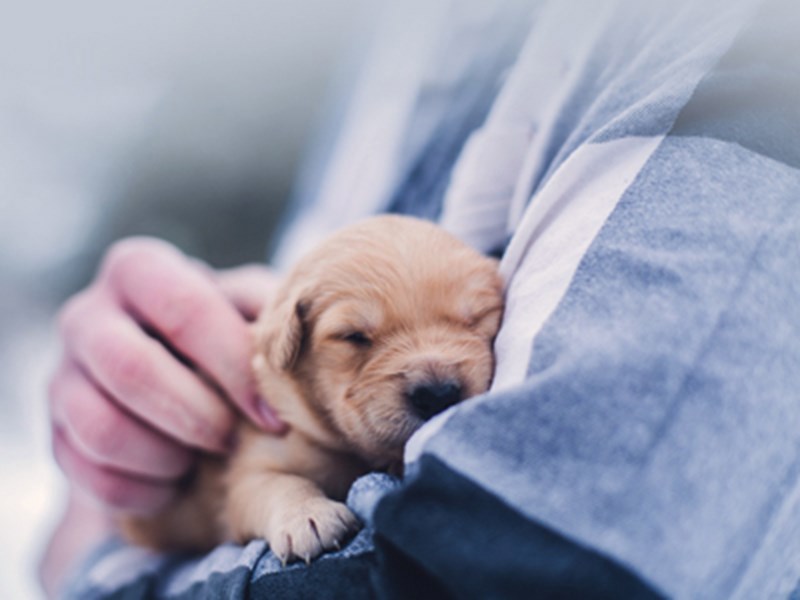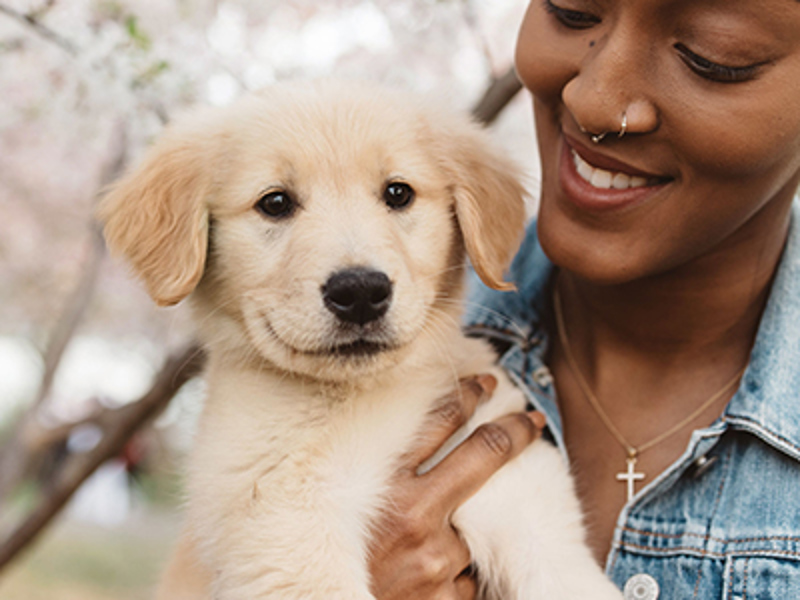
Spaniel (Cocker)
Breed characteristics
- Size
- Small
- Exercise
- Up to 1 hour per day
- Size of home
- Small house
- Grooming
- Every day
- Coat length
- Medium
- Sheds
- Yes
- Lifespan
- Over 10 years
- Vulnerable native breed
- No
- Town or country
- Either
- Size of garden
- Small/ medium garden
About this breed
The breed's name comes from its original function, as he was used to hunt woodcock. The breed was not recognised as a separate variety until 1893 and until that time all the spaniels, collectively known as Land Spaniels, were bred together and later classified depending on size and colour. They were selectively bred for suitability for their work and for the terrain. It was a requirement that a Cocker Spaniel should simply be under 25 lbs in weight. Whilst blacks dominated the rings in the early shows, Welsh Springer outcross was used to establish parti-coloured lines.
The Cocker Spaniel earns the epithet 'the merry cocker' for his ever-wagging tail denoting his happy temperament. In the early 20th century the breed was at its height of popularity and it remains hugely popular as a family pet.
Images for this breed
The Gundog breed group
Dogs that were originally trained to find live game and/or to retrieve game that had been shot and wounded. This group is divided into four categories - Retrievers, Spaniels, Hunt/Point/Retrieve, Pointers and Setters - although many of the breeds are capable of doing the same work as the other sub-groups. They make good companions, their temperament making them ideal all-round family dogs.
Colour Watch
Category 4: Breeds with >30% registered NBS colours or more than 1000 NBS registrations per annum
Breed Standard colours
Breed standard colour means that the colour is accepted within the breed standard and is a traditional and well-known colour in this breed.
Breed standard colours in this breed include:
- Black
- Black & Tan
- Black & White
- Black & White Ticked
- Black White & Tan
- Blue Roan
- Blue Roan & Tan
- Chocolate
- Chocolate & Tan
- Chocolate & White
- Chocolate Roan
- Chocolate Roan & Tan
- Chocolate White & Tan
- Golden
- Lemon & White
- Lemon Roan
- Liver
- Liver & Tan
- Liver & White
- Liver & White Ticked
- Liver Roan
- Liver Roan & Tan
- Liver White & Tan
- Orange & White
- Orange & White Ticked
- Orange Roan
- Red
Non-breed-standard colours
Non-breed-standard colour means that the colour is not accepted within the breed standard and whilst some dogs within the breed may be this colour, it is advised to only select a dog that fits within the breed standards for all points.
Colour is only one consideration when picking a breed or individual dog. Health and temperament should always be a priority over colour.
Non-breed-standard colours in this breed include:
- (NBS) Sable
- (NBS) Black Sable
- (NBS) Blue Roan Sable
- (NBS) Chocolate Sable
- (NBS) Chocolate Sable Roan
- (NBS) Dark Sable
- (NBS) Gold Sable
- (NBS) Red Sable
- (NBS) Sable Roan
Other colour/s
'Other' means you consider your puppy to be a colour not currently known within the breed and one that does not appear on either the breed standard or non-breed-standard list. In this instance you would be directed through our registration process to contact a breed club and/or council to support you on identifying and correctly listing the new colour.
Health
Whether you're considering buying a Spaniel (Cocker) puppy or breeding from your dog, it's important to understand the health issues that may affect the breed and how they can be managed or avoided.
Pre-breeding health screening
Good Practice schemes and tests
We strongly recommend that breeders, at a minimum, conduct these tests before breeding, as evidence indicates these conditions are a significant concern in the breed.
- Prioritising genetic diversity
- DNA test for Acral mutilation syndrome (AMS) - Find a list of tested dogs here
- DNA test for Progressive retinal atrophy (prcd-PRA) - Find a list of tested dogs here
- Hip testing (for hip dysplasia) using the BVA/KC Hip Dysplasia Scheme
Best Practice schemes and tests
These tests address conditions that are still significant for the breed, though they may not be as critical as those listed under Good Practice. They might be less common or newly identified, and research is ongoing to determine their full impact.
To support the breed’s health, responsible breeders should ensure they complete all tests in both categories. Following our Best Practice guidelines means completing both the Good Practice and Best Practice tests for your breed.
- DNA test for Adult-onset neuropathy (AON) - Find a list of tested dogs here
- DNA test for Familial nephropathy (FN) - Find a list of tested dogs here
- Eye testing (and gonioscopy for PLA) using the BVA/KC/ISDS Eye Scheme
Click here to find out more about The Kennel Club's health standard
Find out about a particular dog's results
Please visit our Health Test Results Finder to discover the DNA or screening scheme test results for any dog on The Kennel Club's Breed or Activity Register.
You can also view the inbreeding coefficient calculation for a puppy's parents, or for a dog you're thinking of breeding from.
DNA testing services
To support your health testing journey, we provide our tailored Spaniel (Cocker) Breed-Specific DNA Package. Giving you the information you need about potential health risks, this package includes screening for Acral mutilation syndrome (AMS), Familial nephropathy (FN), Progressive retinal atrophy (prcd-PRA) and DNA Profile (SNP - ISAG 2020)
4 essential tests valued at £255 for just £150, that screen for multiple conditions at once, saving you time and providing vital health information. 
Breed health & conservation plan
The Breed Health and Conservation Plans
Our breed health and conservation plans (BHCPs) use evidence and data to help us understand the health issues found in each pedigree dog breed. These plans help breeders and owners identify health and welfare problems and use information, health tests and health schemes to avoid passing on those problems to future puppies. They also support and provide breeders with tools and specialist expertise to help manage genetic diversity, understand the impacts of close breeding, and find the best ways to preserve the population of their breed.
Working together for the breed
We’ve worked with breed clubs and breed representatives to gather all available evidence to help us determine the priority concerns for the breed and decide how we can work together to manage and reduce these problems.
Breed priorities
The current key priorities for the breed are:
- Immune mediated haemolytic anaemia (IMHA)
- Pancreatitis
- Thyroid conditions
How we plan to make improvements
We’ve agreed the following list of actions with the breed clubs to improve the health of the breed. Both parties are committed to working on these areas and will review these on a regular basis to ensure the actions remain focussed and relevant to the breed’s health.
Breed Club actions include:
- The Health Committee to consider appointing a member to represent the working population of the breed – COMPLETE (this action was completed in 2019)
- The breed clubs and the Kennel Club to continue to monitor any research with regard to the breed – IN PROGRESS
Our actions include:
- To keep the breed updated on any progress made with the spinal scheme – IN PROGRESS (We work with a group of specialists that form a neurology development group, who are looking at the feasibility of expanding the Dachshund IVDD scheme to other breeds. As well as this, the Kennel Club Genetics Centre has recently run an IVDD survey for Cocker Spaniel breeds to analyse the prevalence and possible influencing factors within the population)
- To investigate whether any population analysis can be undertaken on the working and show populations individually – IN PROGRESS (We are revising every breed’s population analysis throughout 2023, and will be releasing the findings from these once available)
- To share the findings of the Roslin Institute’s population analysis study
- To raise the feasibility of the Cocker Spaniel being involved in any thyroid research at the Royal Veterinary College – COMPLETE (this action was completed in 2019. Unfortunately at the time the Royal Veterinary College were unable to undertake a thyroid specific study, but have recently produced a breed-specific VetCompass paper for the Cocker Spaniel)
The full evidence base is available at the discretion of the breed clubs, however if you would like to seek access to the full report, please contact our health team here.
Health (The Kennel Club)
How do I use this information?
Breeders should be mindful of the top priorities in their breed and ensure they are working to reduce and eliminate the presence of these diseases when choosing to breed their dogs.
Puppy buyers should also be aware of these issues and be sure to ask their breeder how they are contributing towards the above actions, and whether any of these problems have been seen in their breeding lines.
More about health
If you have any concerns about a particular health condition in your breed then you may wish to speak to your vet or you could contact your breed health co-ordinator.
Breed health co-ordinators are individuals working on behalf of breed clubs and councils who are advocates for the health and welfare of their chosen breed. They acts as a spokesperson on matters of health and will collaborate with The Kennel Club on any health concerns the breed may have.
To contact your breed health co-ordinator please email
Breed watch
Category 1
Currently no points of concern specific to this breed have been identified for special attention by judges, other than those covered routinely by The Kennel Club's breed standard.
Breeding restrictions
There are a number of The Kennel Club's rules and regulations that may prevent a litter from being registered, find out about our general and breed specific breeding restrictions below.
More about breeding
There are not currently any additional breed specific restrictions in place for this breed.
Looking for a puppy?
Looking for a Spaniel (Cocker)? Explore our list of puppies and rescue dogs for sale near you.
More information

Need to find out more about a breed?
Use our Find a Club service where you can locate breed clubs that can offer support and advice.

Use our Find a Puppy service
The Kennel Club's Find a Puppy service provides contact details for breeders who have puppies available. Let's help you find your new best friend.

Get the best lifetime pet insurance
At Kennel Club Pet Insurance, we want you to focus on getting the best possible treatment for your dog without worrying about the cost.
